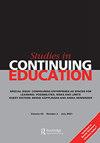The experience of mothers as university students and pre-service teachers during Covid-19: recommendations for ongoing support
IF 1.9
4区 教育学
Q2 EDUCATION & EDUCATIONAL RESEARCH
引用次数: 3
Abstract
ABSTRACT When the Covid-19 pandemic hit Australia in 2020, lockdown restrictions meant that the lives of tertiary students and mothers underwent substantial adjustment. Universities quickly adapted to full online learning with implications for accessibility and efficacy of online technologies, and home environments suitable for learning. Mothers who were studying at university had to readjust their study, work, care and home responsibilities to home-school their children around others in the home, further complicating the boundaries of work/family life. This study aimed to understand how Covid-19 affected mothers as pre-service teaching students within a university education faculty, exploring mothers’ perceptions of university supports and their effectiveness. Eight mothers participated in the study using narrative inquiry and feminist methodology. The data shows effects of the pandemic were both negative (heightened stress, financial strain, less sleep) and positive (stronger family bonds, partners more involved in childcare). Recommendations for improved supports do not only apply within a pandemic context, and include opportunities for affordable childcare, more flexible study options and more financial incentives. Overall, universities need to acknowledge mothers as an important demographic who have caring responsibilities, and work to ensure a more equitable experience for this marginalised group of students.母亲在新冠肺炎期间作为大学生和职前教师的经历:持续支持的建议
当2020年新冠肺炎大流行袭击澳大利亚时,封锁限制意味着大学生和母亲的生活经历了重大调整。大学迅速适应了全面的在线学习,这意味着在线技术的可访问性和有效性,以及适合学习的家庭环境。在大学读书的母亲不得不重新调整自己的学习、工作、照顾和家庭责任,让孩子在家里和其他人一起上学,这进一步使工作/家庭生活的界限复杂化。本研究旨在了解Covid-19如何影响大学教育学院职前教学学生的母亲,探索母亲对大学支持及其有效性的看法。采用叙事探究和女权主义方法论,8位母亲参与了研究。数据显示,大流行的影响既有负面影响(压力增加、经济紧张、睡眠减少),也有积极影响(家庭关系更紧密、伴侣更多地参与照顾孩子)。关于改善支持的建议不仅适用于大流行背景,还包括提供负担得起的托儿机会、更灵活的学习选择和更多的财政奖励。总的来说,大学需要承认母亲是一个有照顾责任的重要群体,并努力确保这一边缘化学生群体获得更公平的经历。
本文章由计算机程序翻译,如有差异,请以英文原文为准。
求助全文
约1分钟内获得全文
求助全文
来源期刊

Studies in Continuing Education
EDUCATION & EDUCATIONAL RESEARCH-
CiteScore
4.70
自引率
6.70%
发文量
22
期刊介绍:
Studies in Continuing Education is a scholarly journal concerned with all aspects of continuing, professional and lifelong learning. It aims to be of special interest to those involved in: •continuing professional education •adults learning •staff development •training and development •human resource development
 求助内容:
求助内容: 应助结果提醒方式:
应助结果提醒方式:


